#Macedonian soldiers
Explore tagged Tumblr posts
Note
Do you think that Alexander was truly liked by those around him, in a personal level? True friendship. Not really Hephaistion but also like Ptolemy, Seleucus, Roxanne, Arrhidaios, those who grew up with him or were his closest circle. Or was it all cynical politics?
Found it! That was weird. Appearing/disappearing asks?
Did the people around Alexander like him?
Did the people around Alexander like him? Hephaistion did. But the rest?
The asker refers to his personal circle, but I want to address this more broadly. I’ll return to his personal circle at the end.
First, we must beware of that pesky “shading” by later authors as part of their attempts to use Alexander’s career for commentary on their own time. They meant to show how success and power spoilt him and made him into a tyrant. That said, I believe he was well-liked overall. Yet things did change over time.
He began as king of a (relatively) small kingdom in northern Greece where all a Macedonian had to do before addressing him was to take off his hat—didn’t even use the title “King.” By his death, he’d taken over in a tradition that depicted rulers as “King of Kings” and “King of the Four Quarters” [e.g., the Whole World], even a god-king (Egypt). Going from (little) Macedonia to (enormous) Asia naturally cut down on his availability to soldiers and even his own Companions/Hetairoi—which pissed them off. Partly, it was simple logistics. He had too many responsibilities, and too many people wanted a piece of his time. Yet after Darius’s death in 330, he also added layers of court ceremonial to better align with ancient near eastern royal expectations and secure Persian respect.
That alienated his own people (maybe more than he expected). However exaggerated I believe the objections to his adoption of Persian custom, there’s little doubt it wasn’t well-received by traditionalists who preferred their kings approachable. Now, be aware: that approachability was more curated than our sources admit, as these sources inflated shifts to serve their own themes. Macedonian kings had bodyguards for a reason, and certain aspects of divine charisma were associated with their physical person (see below). The average citizen could NOT just wander up to one for a chat. Even so, elaborate Persian ceremonial was quite alien to Macedonia.
Nor was such ceremonial required of Macedonians in 330; our sources note that Alexander was essentially running two parallel courts with differing expectations. Nonetheless, the Macedonians took exception to the changes, offended to see “their” king “succumb” to foreign ways. He was getting uppity. They may also have feared it would trickle down to them eventually, even if it hadn’t yet.
Kleitos the Black’s exact words to Alexander in their infamous, alcohol-fueled spat is 99% invented. (Except maybe the line from Euripides; I’m least suspicious of that.) Some of it involved a play mocking officers who’d died recently at the Marakanda massacre as a means to absolve Alexander, who hadn’t been present, but whose failure to clarify the chain of command got them killed. I suspect that was a lot of it. But as with all “straw that broke the camel’s back” fights, it quickly escalated into a litany of complaints. Some of those were about the changes at the court. And Kleitos didn’t survive the encounter.
Alexander’s remorse appears to have been genuine. And the fact the army was ready to convict Kleitos of treason after-the-fact, said a lot about their empathy for the king. Nonetheless, after that, NOTHING was the same for his inner circle. In the right circumstance, he might kill you. And the army would absolve him of it.
Yet the army didn’t regard every negative act by Alexander as forgivable. They were not willing to overlook the murder of Parmenion. If they could understand/see themselves getting worked up enough to kill even a good friend when drunk, the cold, calculated removal of a potential (not even demonstrated) political threat was something else again. Especially a threat who’d served Alexander (and Philip) with such distinction.
E.g., nuance is required when assessing soldierly opinion.
A couple more things suggest Alexander was—overall—beloved:
1. At the battle of Granikos, he was elected the ancient equivalent of MVP; an award made by soldiers. He accepted, then never allowed his own name to be in the running again. Yet it was an award from the soldiers, and means he was respected not just as a leader, but as a fighter.
2. During both so-called “mutinies,” the soldiers didn’t want to kill him, they only wanted him to change his policies. If there’s some doubt the first actually occurred, the second at Opis certainly did. Yet when he showed the soldiers what it would mean to reject him (he replaced them), they came crying for his forgiveness. They didn’t say, “Good riddance” and head home.
3. On his deathbed, the Macedonian soldiers clamored so to see him that his top officers had to knock down a palace wall in order for them to parade through and say a final goodbye.
Now, that’s soldiers. What about his Companions/Hetairoi? At this high level, liking or disliking also involved personal advancement and family position—as the asker alluded to.
Those willing to “play ball” (so to speak)—go along with Alexander’s changes—had a whole new world opened. This wasn’t just his personal circle but included figures such as Krateros who understood what side his bread was buttered on. I’m not sure how much love was lost between him and Alexander, but they certainly respected each other. There were others who fell into this category, such as Koinos and Kleitos the White. Non-Macedonians/Greeks too, who may have seen him as a road to higher office than they’d held under Darius, or perhaps just to survival. Although I do think Poros and Alexander had a Moment; Poros remained loyal even after it served him to do so, despite his own son’s death at the Battle of Hydaspes. Something actually clicked with those two, I believe.
As for those who grew up with him—Hephaistion, Perdikkas, Leonnatos, Seleukos, Lysimakos … it seems they did like him, even if they didn’t always like each other. Seleukos was responsible for Perdikkas’s murder, in the Successor Wars later. There were others, but those names float to the top again and again. Similarly, although older, Harpalos, Ptolemy, Erigyios, and Laomedon all got themselves exiled for his sake. And Alexander never forgot it. The man who brought news to Alexander of Harpalos’s first flight (due to embezzling) was initially arrested for a false report. Alexander simply didn’t believe his friend had betrayed him.
And it wasn’t just those men. The tale of Alexander drinking a medical potion given him by his doctor Philip—despite a missive from Parmenion warning him about Philip—became famous as a tale of trust. And sure enough, the drought cured the king, so ATG’s trust was well-placed. A later story about Alexander locking up Lysimachos in a cage with a lion in punishment is almost certainly bogus (with overtones of Roman-era stuff). Other evidence suggests great affection for his men. That’s perhaps why Philotas’s failure to inform him about a conspiracy endangering his life came as such a blow.
One may wonder if some of those guys, like the talented—and older—Krateros, didn’t want to replace him as king? Certainly after his death, they did vie to be kings.* Periodically, I run across some misguided person arguing that Philotas and/or Parmenion wanted to take his place, hence the conspiracy. It’s even embedded in our ancient sources, which didn’t understand Macedonian kingship (were thinking on Roman models).
But those men couldn’t be kings. They weren’t Argeads, and it mattered. (Such supposition also assumes they were part of the real conspiracy, rather than Philotas simply being an arrogant dumbfuck who failed to report it.)
The Argeads had Royal Charisma. Charis is a gift from the gods: literally. It can be beauty and grace, sure, but at its base, it simply means “favor.” The difference between a king and a tyrant was that the former had charis by descent. The men who became tyrants (or tried and failed) all believed they had it too, but by their own demonstrated aretē and timē. That’s why they were never just popular Joe Blow off the street. They were Olympic victors, winning generals, etc. All were also aristocrats and fully intended to establish their own royal dynasties…but failed.
Until the Hellenistic Age. The Successors were just tyrants who made it work. Some (like Seleukos) even created mythological origins for themselves. Daniel Ogden has a good book on the creation of this myth: The Legend of Seleucus: Kingship, Narrative and Mythmaking in the Ancient World. If you’re curious about how all those things go into charis, I recommend it.
It’s not enough to be competent. One also needed the gods’ blessing. Charisma. That’s why Alexander’s officers might compete with and snipe at each other…but not with/at him.*
As for figures such as Roxane or Oxyathres (Darius’s brother who joined ATG’s court after Darius’s murder), it’s impossible to know what their opinion of him would have been. We have zero reliable evidence. It would seem Sisygambis (Darius’s mother) genuinely liked him. But again, this may have served later narratives, so I wouldn’t swear to it. She might have just made the best of a bad situation.
So! The final vote is that he seems to have been more popular/well-received than not … for a rather ruthless ancient world conqueror. Ha. I think that’s part of his eternal fascination. He’d be far less interesting if he’d simply been a monster.
Also, I forgot, but I did a separate post a while back on a related topic: Did Alexander's Companions Like Each Other
————————
* It took some years before the Successors started using the title “King” (Basileus). Antigonos Monophthalmos was the first, if I remember right, around the same time Alexander IV was murdered by Kassandros—and he didn’t claim the title himself. It was given him by Athens. Up to that point, they’d all simply called themselves “governors” and/or “regents.” Even if they might have been privately considering how to become kings in their own right, the charisma of Macedonian kingship belonged to the Argeads. Getting rid of Alexander IV (quietly), then Olympias’s murder of Philip III Arrhidaios and Hadea Eurydike left no Argeads. Then Alexander’s empire could become “spear won” territory.
#asks#Alexander the Great#Kleitos the Black#Hephaistion#Harpalos#Krateros#Philotas#Parmenion#Alexander's soldiers#ancient Macedonia#Macedonian politics#the politics of friendship at the Macedonian court#Classics#tagamemnon
35 notes
·
View notes
Text






The Army of Alexander the Great
Alexander the Great's soldiers were some of the most disciplined, innovative, and battle-hardened forces of the ancient world. His army was primarily composed of Macedonian and Greek troops, augmented by soldiers from conquered regions as his empire expanded. Here’s a brief overview of key elements of Alexander’s military forces:1. The Macedonian PhalanxCore Infantry: The backbone of Alexander's army, the phalanx consisted of tightly-packed infantry armed with the sarissa, a 4-6 meter (13-20 feet) long spear.Formation: Soldiers in the phalanx operated in close ranks, creating an impenetrable wall of spear points. Their discipline and cohesion were unmatched.2. The Companion Cavalry (Hetairoi)Elite Cavalry: The most prestigious unit, composed of noble Macedonians who served as Alexander’s shock troops.Role: They carried out devastating charges, often led personally by Alexander himself, breaking enemy lines and exploiting weaknesses.3. The HypaspistsElite Infantry: Highly-trained and versatile soldiers who acted as a bridge between the phalanx and cavalry.Role: They protected the vulnerable flanks of the phalanx and participated in siege warfare and special missions.
From "The Army of Alexander the Great"
#military art#history#military#soldier#cavalry#alexander the great#alexander of macedon#philip ii of macedon#greek history#macedonian history#ancient greece#late antiquity
20 notes
·
View notes
Text
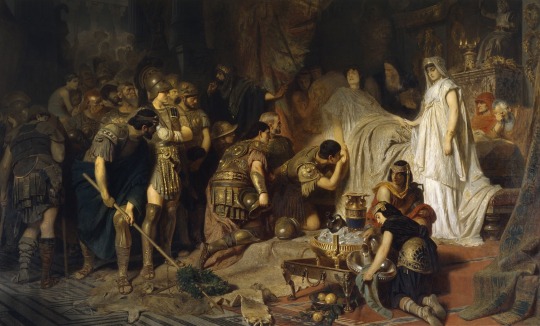
The Dying Alexander the Great bids farewell to his Army
by Karl von Piloty
#alexander the great#dying#bed#art#karl von piloty#army#soldiers#alexander#antiquity#history#europe#european#ancient macedonia#macedonian#macedonia#ancient greek#ancient greece#death#generals#roxana#roxanna#roxane#roxanne
195 notes
·
View notes
Video
EJERCITO-MACEDONIA-ARTE-PINTURA-FALANGE-ALEJANDRO MAGNO-HISTORIA-GRECIA-PINTOR-ERNEST DESCALS por Ernest Descals Por Flickr: EJERCITO-MACEDONIA-ARTE-PINTURA-FALANGE-ALEJANDRO MAGNO-HISTORIA-GRECIA-PINTOR-ERNEST DESCALS- Ejército de Macedonia, al mando del Rey ALEJANDRO MAGNO los hombres forman la FALANGE, la nueva estrategia militar que revolucionó el mundo antiguo en sus guerras, los soldados armados de sus sarisas, lanzas muy largas, forman un erizo que resultaba muy difícil de superar, pintura del artista pintor Ernest Descals sobre papel de acuarela, pintar sobre la historia de Grecia.
#EJERCITO#MACEDONIO#MACEDONIA#ALEJANDRO MAGNO#ALEXANDER THE GREAT#MACEDONIAN ARMY#HISTORY#HISTORIA#GRECIA#GRIEGOS#SOLDADOS#SOLDIERS#MEN#HOMBRES#GUERRA#WAR#ESTRATEGIA#REVOLUCION#KING#REY#FALANGE MACEDONICA#MACEDONIOS#MACEDONIAN PHALANGE#ERIZO#LANZAS#SARISAS#BATALLAS#PINTAR#PINTANDO#PAINTING
2 notes
·
View notes
Text
I wish I could write more fluent macedonian but it’d have nobody to talk to (my grammar woud be shit) and people would think I’m literally every other cyrillic language under the sun (x_x)
#also the historical greek sympothisers like yiiikes#(btw if you like the folklore/myths that's ok but like the stuff the actually greek soldiers did to other countries should be talked about-#when I talk abt atrocities in greek history it mainly focuses on macedonian because I'm macedonian (big shocker) )#I want to ramble about this SO BAD because it's rarely talked about since macedonians are just greek#which has been perpetuated BY. THE. HISTORICAL. GREEKS. and still some to this day :/#i already rambled too much lol please ask me more but I'll try not to ramble my ass off X_X
0 notes
Text
⸻ The Lost Queen - XVIII ⸻
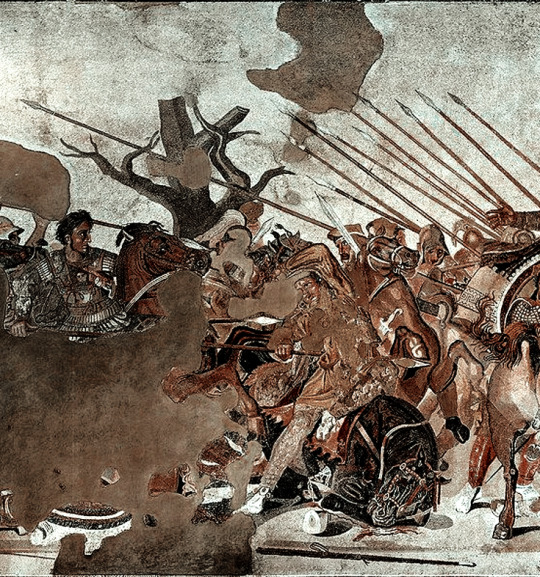
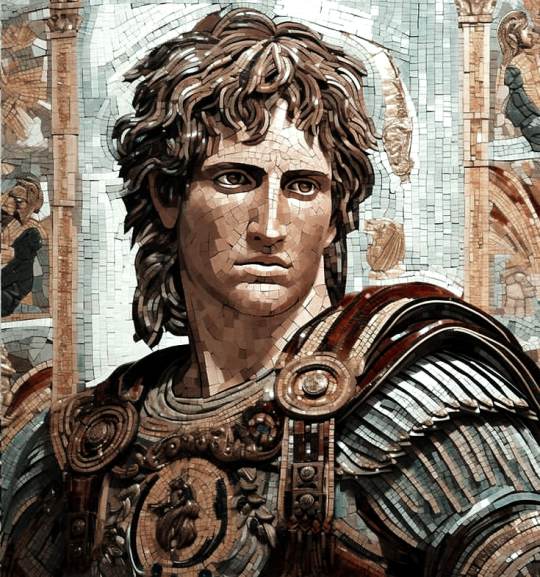
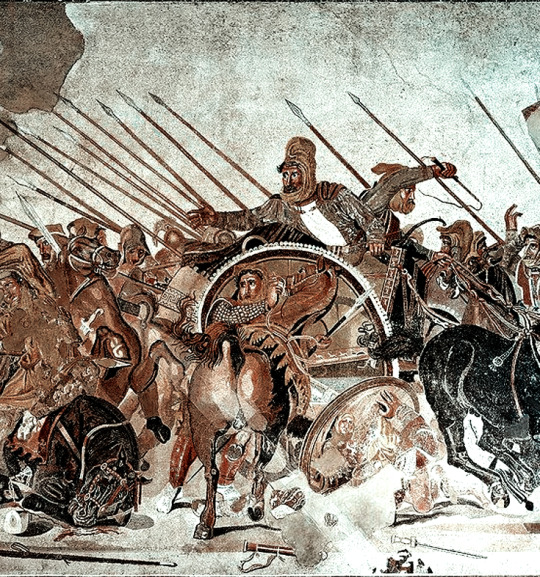
— summary: You woke up near a military camp without remembering how and why you got there, you didn’t understand why they were dressed like ancient Greeks, all you knew was that you weren’t safe and you needed to get out of that place as soon as possible. Too bad for you that you found yourself attracting unwanted attention from the Macedonian King and he won’t let you go so easily.
— genre: yandere, dark!au.
— warnings: time travel, obsessive and possessive behavior, murder, mention of torture, kidnapping, angst, fluffy (very rarely), dub-con, eventual smut, pregnancy.
— pairing: yandere!alexander the great x female!reader, yandere!generals x female!reader.
— word count: 2,330.
— tag list: @devils-blackrose, @faerykingdom, @hadesnewpersephone, @mariaelizabeth21-blog1 , @kadu-5607, @zoleea-exultant, @borntoexplore11-blog, @silmawensgarden, @elvinapandra, @jennifer0305 , @his0kaswife, @animetye-23.
— the lost queen series masterlist.

Chapter 18
Roxanna felt restless, as if something inside her was in constant conflict. She paced her room, unable to rest, her thoughts racing around a single issue: her impending marriage to Alexander, the foreign conqueror who seemed to be engulfing the world with his ambition.
Her father had been clear. The union was strategic, a calculated move to ensure the survival of his people in the face of the sweeping changes that lay ahead. With Darius’s downfall looking increasingly likely, joining forces with the man who controlled the most feared armies seemed not only sensible, but necessary. ''It is for the good of all,'' he had said, with the grave tone of one who made decisions beyond his own heart. But his words found no echo in hers.
Roxanna tried not to let her panic show, but the reality was suffocating. She knew little of Alexander, only stories she had been told; enough, however, to recognize that he possessed a magnetic presence. His face was striking, almost chiseled, and his eyes shone with an intensity that could both fascinate and intimidate. He was the kind of man who seemed unshakable, but the force that drew crowds to his feet also made her uneasy.
The weight of this choice that was not hers was made even worse by the shadow of another woman. Alexander already had a wife. Roxanna had heard whispers about (Y/N), the so-called Lost Queen. It was a name that soldiers spoke with reverence, almost like a prayer, and it tormented her. (Y/N) was not dead, but missing, possibly captured by the Persians. Despite her absence, her presence seemed to dominate. The adoration that Alexander clearly had for his wife seemed to be transmitted to his men. She had heard that Alexander was sending out searches and preparing to invade Babylon, supposedly where his wife would be.
How could she, Roxanna, compete with her, a figure who loomed like a specter in the midst of Alexander's ambition? Roxanna was beautiful and she knew it. Her beauty was surpassed only by Darius's wife.
More than that, she felt an inner resistance to the idea of sharing. She knew it was common for kings to have multiple wives, but still, the idea of becoming one of many repulsed her. Roxanna wanted to be more than the second wife, more than a symbol of victory over her people. She wanted to be the first, the only. It was a foolish desire, perhaps, but it was hers.
Still, she knew it didn’t matter. The decision wasn’t in her hands. If Alexander wanted her, there would be no escape. Refusal was unthinkable. She would be forced to play the role of wife, to fulfill the role assigned to her, whether her heart was in it or not.
She would be ready to give her heart to Alexander. But he... Was he ready to give his to her?

"A doctor has come to see you, my Queen." Bagoas’s soft voice cut through the silence of the room, respectful and controlled. He waited patiently at the door until you nodded, allowing him to enter. His gaze was always firm but affectionate, as if he were measuring the environment around him before taking a step. You couldn’t help but grow fond of the eunuch.
"Let him in." You replied, trying to hide the nervousness that was setting in. But the anxiety grew in waves, relentless, as the man entered the room. He carried with him a leather bag and a series of strange instruments. The sight of some of them, with their sharp, mechanical shapes, made your stomach turn. For a brief moment, you couldn’t help but think that they looked more like torture tools than healing tools.
You took a deep breath, trying to find calm. After all, this was an order from Perdiccas, who, even without saying it, showed genuine concern. The memory of him hugging you, holding your hand gently, whispering sweet words to you, was both comforting and disturbing. His presence awakened conflicting feelings. Part of you wished he was there, that he hadn't left the room so abruptly. But another part, hurt by the circumstances, wanted distance.
You needed to talk about what was happening. About everything. But not now. You needed to focus on yourself, on protecting yourself and the life growing inside you. At least, until Alexander came to get you.
Your gaze instinctively fell on your hands, which rested on the subtle curve of your belly. It was an almost unconscious gesture, an attempt to protect the life growing inside you. Although you weren't completely sure about the time, you estimated that your pregnancy was already close to four months. The idea was both beautiful and terrifying.
"How are you feeling, Your Majesty?" The doctor asked, his voice grave but gentle, as he took a few steps towards you. There was something in his gaze, a deep green that seemed to seek answers before you could even offer them.
"A little better." You murmured, trying to sound calm, but feeling the weight of your vulnerability. His eyes met yours, and for an instant, you felt disarmed, exposed. The tension in the air was palpable, and the anticipation of the upcoming examination increased the whirlwind of emotions that already took over you.
The doctor’s gaze fell on the discarded sheet next to the bed, where a small but unmistakable stain of blood marked the clear surface. He coughed discreetly, perhaps to disguise the evident discomfort he felt at the delicate situation.
"You were lucky," He said after a brief silence, gesturing for you to spread your legs. The request was direct, professional, but you couldn't help the blush that rose to your cheeks. The idea of exposing yourself like that, even in front of a doctor, made your body stiffen with embarrassment.
But you forced yourself to keep your composure, taking a deep breath to push away the discomfort. "It’s like he’s a gynecologist," you told yourself in your head, trying to rationalize. He was a doctor, after all. It didn’t matter that medicine back then was rudimentary, or that you had doubts about the real effectiveness of his knowledge.
Details. Just details.
"Was I lucky?" Your voice came out in a low murmur, with a slightly bitter tone that you couldn’t hide. The whole situation felt surreal, as if you were trapped in a game that was out of your control.
And that was probably exactly what it was.
The doctor nodded, moving carefully as he lifted the light chiton covering your body. His gaze remained fixed on his task, professional but intense. "Yes," He replied, his voice deep but calm. "You almost miscarried."
The words hit you like a cold blast, making your heart clench. What had started as discomfort now became palpable fear. You knew the pregnancy was fragile, but hearing it so directly was a cruel confirmation of the vulnerability of this new life inside you.
Instinctively, your hands went back to your belly, as if trying to protect it from any unseen threat. The silence between you stretched for a moment, heavy, as you absorbed what he had said. It wasn’t just luck. It was a warning. And a reminder that your body and mind were carrying far more than they could bear alone.
The doctor carefully lowered your chiton before approaching you again, this time placing his hands on your belly. His initial touch was firm, almost rough, and you flinched instinctively, feeling uncomfortable with the pressure he was applying. He seemed oblivious to your reaction, completely focused on his assessment, but you could barely contain the shiver that ran through your body.
"Why are you doing that so hard?" You started to ask, but he held up his hand, interrupting you before you could finish.
"How long have you been pregnant, Your Majesty?" He asked, his voice serious, his eyes fixed on yours with an intensity that seemed to weigh on you.
For a moment, the question took you by surprise. His incisive tone and the way he stared at you made you nervous, but you knew you had to answer. Swallowing hard, you murmured, "I think I’m four months along..."
He nodded, but his gaze remained skeptical, as if questioning the accuracy of your answer. Stepping back, he seemed to ponder before finally uttering the words that left you speechless.
"I believe you are pregnant with twins."
"Twins?" You repeated in a whisper, almost as if you were asking yourself.
The doctor nodded again, this time with a more serious expression. He seemed to be measuring his words, but he still chose to be direct. "Your belly is more swollen than normal for a single pregnancy," He explained, his voice calm but filled with concern. After a brief sigh, he continued, this time with a darker tone. "Unfortunately, I must warn you of the risks. Giving birth to two babies... It’s dangerous. There’s a good chance you won’t survive the birth."
His words hit you like a blow. Your eyes widened, and the room seemed to close in around you. To die in childbirth. In ancient times. It sounded like a sentence you never imagined you would face. Terror settled in your chest, and for a moment it felt like the air had been sucked out of the room.
You opened your mouth to respond, but before you could utter a word, another voice cut through the silence.
"I suggest you keep your comments to yourself."
It was Perdiccas, his imposing figure appearing in the doorway of the room. His tone was calm, but filled with disapproval as he fixed the doctor with a hard stare. His eyes flashed, as if ready to squelch any further attempts to alarm her. "My Queen is already terrified enough. We don’t need your unnecessary comments."
His presence filled the space, and you felt a mixture of relief and discomfort. Perdiccas had always been a complex figure in your life — protective and, at the same time, charged with an authority that sometimes felt overwhelming. Yet his words, even as a reprimand to the doctor, brought a strange sense of security. As if, for a moment, he was willing to carry the weight you feared to face alone.
The doctor hesitated, clearly disconcerted, but bowed his head in deference. "My apologies, Your Majesty. It was merely a warning." He gathered his things quickly, as if to avoid any further confrontation with Perdiccas, and bowed out.
Now, only the two of you remained in the room. Perdiccas approached slowly, his eyes softening as they landed on you. "I will not let anything happen to you," He said, his voice lower and firmer, like a promise he seemed determined to keep.
And in that moment, you allowed yourself to believe his words. There was something in Perdiccas’ tone, in the firmness of his promise, that seemed sincere. Maybe it was the vulnerability that enveloped you, making him an anchor in the midst of the whirlwind of uncertainty. Or maybe it was the old feelings, the ones you tried to bury, but that now resurfaced, stubborn and undeniable, creating cracks in the armor you had built over time.
He was there, close enough for his presence to warm the cold room, and for a brief moment, you felt a security that you hadn’t experienced in months. Against all the reasons your mind tried to list, you found yourself trusting Perdiccas once again, as if his promise were a rope pulling you out of the abyss.
Or maybe it was the pregnancy hormones.
You just hoped you wouldn't regret it a second time.

Alexander was determined: he would only take Roxanna as his wife if he had the consent of (Y/N), his beloved and first wife, from whom fate had separated him. He knew that to unite with another woman without (Y/N)'s knowledge and permission would be the same as betraying the deep feelings he still harbored for her. It was a line that Alexander was not willing to cross. Acting in the shadows, making decisions that could hurt or dishonor (Y/N), would be an act he would never forgive himself for. The respect and love he had for her were unshakable, and even in the face of difficult circumstances, he was determined to honor them above all else.
But before any decision about Roxanna could be made, he had to recover (Y/N). There was no other path to follow while she was still beyond his reach. Alexander had already made his decision: he would leave for Babylon immediately. No matter the challenges, he was willing to face them.
He would mobilize his army for the mission, for he knew that no effort would be too great to rescue his beloved. He trusted his generals and soldiers completely, loyal men who had always followed him, and it would be no different this time. When he communicated his determination, he was certain that they would support him without hesitation, understanding that, for Alexander, the search for (Y/N) was not only a matter of love, but of honor.
"Call the generals immediately." Alexander's firm voice echoed through the room. The page, without wasting time, bowed hurriedly and ran off to carry out the order.
Alexander was alone for a moment, but his mind was far from there. He could almost smell (Y/N)'s perfume, that delicate and unmistakable aroma that had enveloped him so many times. He seemed to hear the soft melody of her laughter in the background and feel the gentle touch of her fingers against his skin. It was as if the memory of her was more alive than ever, calling him to action.
Finally, he would be going after her. There would be no more delay, doubts or hesitations. Every step he took now would bring him closer to (Y/N), and nothing in the world could stop him from bringing her back.
''I'm coming for you, my Queen.''

— lady l: maybe a shorter chapter but that's because it's like a preparation for chapter 19 and especially 20. I hope you liked it and forgive me for any mistakes! ❤️
See you a in the next chapter! I'll probably post the next this weekend, though. It's practically ready. 😉
Also, expect a lot of drama to come! Alexander is coming to Babylon!! 😚
#tlq#the lost queen#yandere history#yandere historical characters#alexander the great x reader#yandere Alexander the great#yandere Alexander the great x reader#long fic#yandere x reader
465 notes
·
View notes
Note
Hi! Love your takes and all! What do you think of people talking about Penelope being all buff and strong physically as she was "Spartan?" or that she find Odysseus more attractive with blood plaster on his body as she is "Spartan" or such?. Is it true in the Epics? I read something about a Lykurgus or something..I just want to have a nuanced answer to that, also sorry for the silly question.
You are very kind Anon and I am glad you find them useful
Okay for starters I think this whole thing is a massive stereotype in regards to Sparta that "they are all sexually aroused by blood and violence". I mean yes Sparta as we know had an extreme military outline but it is not like they all just killed around to have fun like a twisted version of Asterix village or something. They valued war and the strength in war of course and they took pride to their warfare and all but yeah I think the whole thing of "oh gosh! Blood! Foreplay for Spartans" is just a joke that goes too far sometimes (although we DO have some exaggerated sources about the Spartans but, surprise surprise, they come from their main rival, Athens so yeah one needs to consider that too. So yeah although the Spartans were strictly military I do not think it is actually realistic to say that they all went like:

lol XD
Two this "Sparta" that they mostly mention is at least 100 years if not more away than the "Sparta" mentioned in the epic cycle. You see the Epic Cycle might have been synthesized at the 8th century BC but the events taking place in it, reflect on the Bronze Age or the Mycenean kingdoms which existed before. These "Spartans" everyone speaks about is usually referring to the Doriean Spartans. The Dorieans were a Greek set of tribes with their own dialect that came down from the north at the year around 1100 BC, around 100 years after the estimated date of the events of the Trojan war and they got to remain to the areas such as Macedonia or Lacedaimona aka Sparta thus we have Macedonians and Spartans speak Doric Greek dialect while Atheneans speak Attic Greek dialect and the Asia Minor greek cities speak Ionian etc Either way as I said the events of the Trojan war happened around 100 years before this Doric Tribe descend much less till the strictly military spartan system to be fully crystallized. So we need to think of that. And even then it is not like the Spartan women were some sort of body-builders who didn't have any sort of binary roles to their society or being active warriors in armies etc (don't mistake them for Amazons guys! Hahahaha!). They did actively excersize more than most Greek cities at that time and they did take part in athletic events more than let's say Athens (Athenean women by n large seemed to participate in sports such as running and those were exclusively for Hera's celebrations) so we can imagine they would be more athletic than the average Greek lady but that doesn't mean they were soldier-trained or anything. The military training was for boys at the city of Sparta. And women still had their own binary roles in their respected society, they just had some more freedom as compared to their Athenean counterparts.
So even if Myceneans DID have a more military form of society or at least based on the findings they did focus on warfare to their art and such and the building of their walls and all they still wouldn't be the same as the doric Sparta that were exclusively military. Could perhaps mycenean Sparta have the basis for the future doric Sparta? Perhaps but I doubt we have sufficient evidence to say they are identical.
Three. I believe that people who wanna desperately depict Penelope as some buff lady, misses the concept of Penelope's strength in the Odyssey. Penelope was not strong because she could fight with the sword. She was strong because she was mentally steadfast, clever and resourceful and enduring and she managed to hold the kingdom of Ithaca steadfast by herself for 20 years. It wasn't about her being buff lady. Homer does seem to imply she was tall and stoutly buillt; see my other post where I mention her physical description in Homer:
but not buff as "I'm gonna kick your ass" buff and all. Homer doesn't mention that any of the Spartan princesses have some specific training (Helen Clytemnestra or Penelope) but later literature implies that they have basic knowledge on weaponry (for example in later 5th century dramas and above Clytemnestra not only is seen wielding a weapon but knowing some basics as to how it was made) but it needs to be said that the posthomeric sources were also influenced by their contemporary Sparta aka the doric military Sparta. Homer doesn't imply that this strict military doric way of life was part of his lore but he does imply that Sparta relies more to its military (as compared to Ithaca or Pylos for example) so maybe he attempts to create the illusion of historical continuation but either way no this whole "300s-like" Sparta was not crystalized yet to the times that Homer synthesized his poems much less to the time of Bronze Age.
And there is no hint that Penelope goes "WOW BLOOD!" that seems to me one of the overused jokes on the internet, again emanating by the whole series of Sparta stereotypes used for comedy. It was in fact Euryclea the one to almost welp in happiness seeing Odysseus covered in blood and that was because Odysseus had killed the men she hated. Penelope doesn't show such a thing. Odysseus also washes himself up to be presentable to her. And even in posthomeric sources Penelope was not linked to physical strength but rather with the strength of her mind and the purity of her intentions (well...except maybe from Parthenius narrative if I recall correctly. There Penelope is pictured as scheming in jealousy against one of the sons Odysseus ellegedly produced and manipulated her husband to kill his illegitimate son)
As for the last part I am not sure what you are referring to? Are you referring to Lycurgus that is mentioned in some later sources as king? I did find for example the reference of Plutarch (who lives much much later) that he implies that Lycurgus lives at the same time as Homer or possibly had met him personally but is that what you are referring to? Either way I assume you refer to the historical person rather than some mythical figure because in homeric realm we do have rulers such as Tyndareus (the king of Sparta father to Helen and Clytemnestra) and Icarius (father to Penelope). It seems that Homer with the mention of the two rulers, even if not directly mentioning it, seems to be winking at the later but still ancient custom of doric Sparta to have two kings but I am not sure if that truly was his objective (and therefore creating an anachronism most likely)
I hope that answers your questions a bit
#katerinaaqu answers#the iliad#the odyssey#homeric poems#penelope#odypen#penelope of ithaca#penelope of sparta#sparta#doric greeks
87 notes
·
View notes
Text

The kausia was an ancient Macedonian flat hat, commonly worn during the Hellenistic period, possibly even before Alexander the Great’s time. It was part of the royal attire for Macedonian kings, often adorned with a diadem. The hat served both as a symbol of status and practical protection against the sun, used by soldiers and commoners alike. The kausia has been depicted on coins, statues, and frescoes across regions influenced by Macedonian culture. Its design may have inspired similar headgear in modern-day #Afghanistan and #Pakistan, known as the pakol
#kausia #ancientcivilization #egyptology #roma #ancientart #arch #prehistoric #culturalheritage #anthropology #italia #ancientrome #antiquity #ancientcity #neolithic #ologie #roman #romanempire #a #nature #bronzeage #greece #historia #megalithic #arthistory #temple #egyptian #photooftheday #medieval #archaeologicalexcavation #like #ruins
#kausia#history#archaeology#photography#culture#greek coins#travel#roman coins#palestrina#sidon saida tyre beirut phoenician الصديق_الصدوق#الصديق_الصدوق#macedonian
81 notes
·
View notes
Photo

Alexander's Siege of Tyre, 332 BCE
After defeating Darius III at the battle of Issus in November 333 BCE, Alexander marched his army (about 35,000-40,000 strong) into Phoenicia, where he received the capitulation of Byblus and Sidon. Tyrian envoys met with Alexander whilst he was on the march, declaring their intent to honour his wishes.
Causes of the Siege
Alexander's request was simple: he wished to sacrifice to Heracles in Tyre. (The Phoenician god Melqart was roughly the equivalent of the Greek Heracles.) The Tyrian's recognised this as a Macedonian ploy to occupy the city and refused, saying instead that Alexander was welcome to sacrifice to Heracles in old Tyre, which was built upon the mainland. Old Tyre held no strategic importance - it was undefended and the Tyrian navy was stationed in the harbours of new Tyre.
The Tyrian refusal to capitulate to Alexander's wishes was tantamount to a declaration of war. But, despite the youthful Alexander's growing reputation, the Tyrians had every reason to be confident. In addition to a powerful navy and mercenary army, their city lay roughly half a mile (0.8 km) offshore, and, according to the account of the historian Arrian, the walls facing the landward side towered to an impressive 150 ft (46m) in height. Whether they actually stood that high is doubtful and open to debate, but even so, the defences of Tyre were formidable and had withstood a number of mighty sieges in the past. The Tyrians began their preparations and evacuated most of the women and children to their colony at Carthage, leaving behind perhaps 40,000 people. Carthage also promised to send more ships and soldiers.
Alexander was aware of Tyre's supposed impregnability and convened a council of war, explaining to his generals the vital importance of securing all Phoenician cities before advancing on Egypt. Tyre was a stronghold for the Persian fleet and could not be left behind to threaten Alexander's rear. In a last-ditch attempt to prevent a long and exhaustive siege, he despatched heralds to Tyre demanding their surrender, but the Macedonian's were executed and their bodies hurled into the sea.
Continue reading...
82 notes
·
View notes
Text
Milunka Savić, the Most Decorated Female Combatant in History: Savić disguised herself as a man in order to join the Serbian army during the Balkan Wars, then served again during WWI, earning medals from Serbia, France, Russia & Britain; she also provided medical support to anti-fascists during WWII and spent 10 months in a Nazi concentration camp
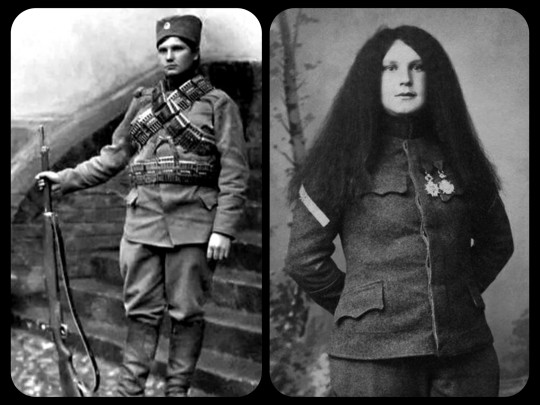
This is a total rewrite of a post that I did last year, with much more detailed information, more photos, and some additional sources.
Milunka Savić is regarded as the most decorated female combatant in history. She fought for the Serbian Army during both of the Balkan Wars, before returning to the battlefield again during WWI. Savić was wounded in battle on 9 separate occasions and survived the Serbian Great Retreat, making the perilous journey across the mountains of Montenegro and Albania through the dead of winter with a serious head injury.
Her military career began during the First Balkan War in 1912, when her younger brother was called up to serve in the Serbian army, and she decided that she would covertly take his place. She cut her hair, wore men's clothing, and presented herself as her brother.
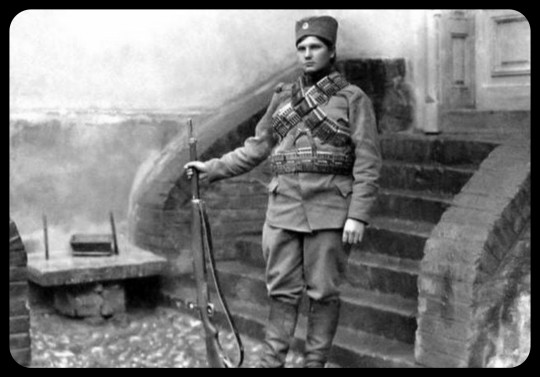
The First Balkan War, 1912: Milunka Savić as a young soldier during the First Balkan War, shortly after joining the Serbian army
She was able to hide her true identity for quite some time. Her skills as a soldier quickly became evident as the war progressed, and she earned her first medal/promotion during the Battle of Bregalnica in 1913. Unfortunately, she was hit by shrapnel from a Bulgarian grenade during her tenth deployment, causing injuries to her chest and abdomen, and those wounds (along with the subsequent medical treatment) ultimately led to the discovery that she had lied about her identity.
In recognition of her accomplishments on the battlefield, her commanding officer decided not to punish her for the initial deception, but informed her that she would not be allowed to return to combat -- as a woman, she could only be transferred to the nursing division instead.
As the story goes:
Savić was called before her commanding officer. They didn't want to punish her, because she had proven a valuable and highly competent soldier, and the military deployment that had resulted in her [sex] being revealed had been her tenth; but neither was it suitable for a young woman to serve in combat. She was offered a transfer to the Nursing division. Savić stood at attention and insisted that she only wanted to fight for her country as a combatant.
The officer said he'd think it over and give her his answer the next day. Still standing at attention, Savić responded, "I will wait." It is said he only made her stand an hour before agreeing to send her back to the infantry.
Savić was able to serve in a combat role throughout the remainder of the Balkan Wars.
The Second Balkan War finally came to an end in 1913, but that peace was short-lived, as World War I erupted just a year later. Savić returned to the military once more, serving in the elite "Iron Regiment" of the Serbian army.
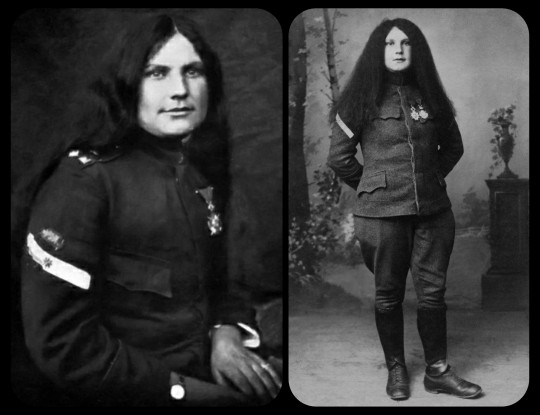
World War I, c.1915-1916: Savić was no longer forced to hide her identity when she returned to battle during WWI, and these images show her posing in uniform with her hair grown out
Savić received the Serbian Karađorđe Star with Swords medal on two separate occasions during WWI; the second medal was given to her after the Battle of Crna Bend in 1916, where she was credited with single-handedly capturing 23 Bulgarian soldiers. She received several other medals throughout the course of her career, including the French Legion of Honor (twice), the French Croix de Guerre, the Russian Cross of St. George, the British Medal of the Most Distinguished Order of St. Michael, and the Serbian Miloš Obilić.
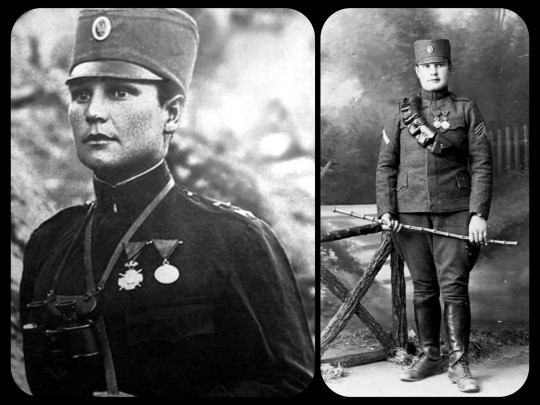
WWI, c.1915-1916: Milunka Savić as a Corporal in the Iron Regiment
She suffered a serious head injury while fighting along the Macedonian front, and she was still gravely wounded when Austro-Hungarian, German, and Bulgarian forces gained control of Serbia in the winter of 1915. The Serbian army was then ordered to make a full retreat from Serbia; Savić and her fellow soldiers, along with the Serbian government and more than 200,000 civilians, were all forced to flee through the mountains of Montenegro and Albania in the dead of winter, hoping to reach Allied forces along the Adriatic Coast -- a perilous journey that would later be known as the Serbian Great Retreat (or the Albanian Golgotha). Roughly 400,000 people embarked on this journey, and less than 180,000 of them survived, eventually reaching the Allied ships along the Adriatic coast.
Despite her injuries, Milunka Savić was among the survivors. She was sent to an infirmary, where she spent several months recovering from her injuries, before she returned to the battlefield alongside Allied forces.
At the end of the war, the French government offered to provide Savić with a full pension and living accommodations in France, in recognition of her actions while serving alongside the French military during WWI. She ultimately declined the offer and chose to retire back in Serbia instead, where she and her husband settled down to raise their daughter and three other girls that Milunka had adopted. The couple would later separate, however, and Milunka was left to raise her children as a single mother, working at a local bank to make ends meet.
In 1941, Serbia (which was then part of Yugoslavia) fell under Nazi occupation. During this period, Savić was involved in providing medical support to local partisans and anti-fascists who had resisted the Nazi occupation. She was eventually arrested by German officers; there are differing accounts of the events leading up to her arrest, with some sources suggesting that she was arrested as a result of her involvement with the local partisans and other anti-fascist elements, while other sources claim that she was arrested after she offended several Nazi officials by openly refusing to attend a formal banquet that was being held in honor of the German military campaign. In any case, she was imprisoned at the infamous Baljinca Concentration Camp for ten months before finally being released.
She faced other forms of hardship in the aftermath of WWII, as she struggled to support herself and her children. She worked several low-paying jobs over the years, while living in a dilapidated, decaying house in Belgrade. Her name (and her long list of accomplishments) had largely faded into obscurity by then.
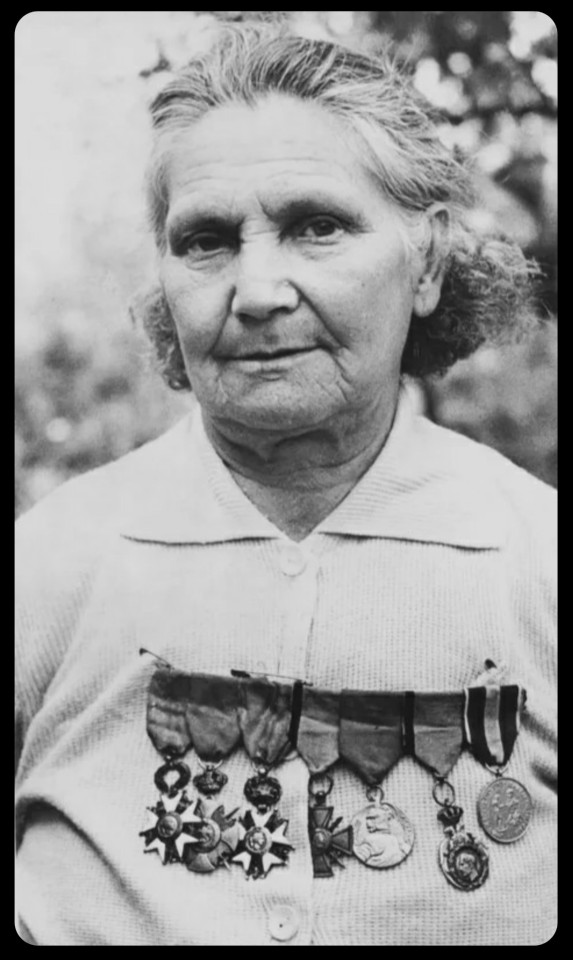
Serbia, 1972: Milunka Savić proudly displaying some of her medals in 1972, when her story became more widely known
It wasn't until the early 1970s that her involvement with the military finally began to receive more widespread attention, both in Serbia and abroad. Following the 1972 publication of an article that told her story, her local community in Belgrade quickly rallied to provide her with newer, more suitable living arrangements.
Sadly, she passed away within just a year of the article's publication.
In 2013, Milunka Savić's remains were relocated from the small mausoleum where they had been interred since 1973, and she was reburied in Belgrade's "Alley of the Greats," where some of the most well-known and most widely respected Serbians are laid to rest.
Sources & More Info:
Research Gate: Milunka Savić: the Forgotten Heroine of Serbia
Girl Museum: Milunka Savić
Law and Politics: The Position of Women in the Serbian Army
Medium: The Fearless Woman-Bomber Who Died Proud, Broke, and Forgotten
Wikipedia: Milunka Savić
Mental Floss: The Serbian "Great Retreat" Begins (WWI Centennial)
#history#Milunka Savić#women in history#serbia#women in the military#balkans#military history#wwii#wwi#yugoslavia#milunka savic#challenging gender norms#feminism#femininity#serbian history#women's liberation#women in war#real-life mulan
130 notes
·
View notes
Text

Homosexuality in History: Kings and Their Lovers
Hadrian and Antinous Hadrian and Antinous are famous historical figures who epitomize one of the most well-known homosexual relationships in history. Hadrian, the Roman Emperor from 117 to 138 AD, developed a close friendship with Antinous, a young man from Egypt. This relationship was characterized by deep affection and is often viewed as romantic. There are indications of an erotic component, evident in Hadrian's inconsolable reaction to Antinous's tragic death. Hadrian erected monuments and temples in honor of Antinous, underscoring their special bond.
Alexander the Great and Hephaestion The ancient world was a time when homosexuality was not as taboo in many cultures as it is today. Alexander the Great and Hephaestion are a prominent example of this. Alexander, the Macedonian king from 336 to 323 BC, and Hephaestion were best friends and closest confidants. Their relationship was so close that rumors of a romantic or even erotic connection circulated. After Hephaestion's death, Alexander held a public funeral, indicating their deep emotional bond.
Edward II and Piers Gaveston During the Middle Ages, homosexuality was not as accepted in many cultures as it is today. The relationship between Edward II and Piers Gaveston was marked by rumors and hostilities, demonstrating that homosexuality was not always accepted in the past. Their relationship is believed to have been of a romantic nature, leading to political turmoil and controversies. Gaveston was even appointed Earl of Cornwall by Edward, highlighting their special connection.
Matthias Corvinus and Bálint Balassi In the Renaissance, there was a revival of Greco-Roman culture, leading to increased tolerance of homosexuality. Matthias Corvinus ruled at a time when homosexuality was no longer illegal in Hungary. The relationship between Matthias Corvinus and Bálint Balassi is another example of homosexuality being accepted during this period. Matthias Corvinus had a public relationship with Bálint Balassi, a poet and soldier. Their relationship may have been of a romantic nature, as Balassi was appointed as the court poet, and it had cultural influence.
These relationships between the mentioned kings and their lovers are remarkable examples of the long history of homosexuality in the world. In many cultures of antiquity and the Middle Ages, homosexuality was not as strongly stigmatized, demonstrating that homosexuality was not always rejected in the past.
Text supported by Bard and Chat-GPT 3.5 These images were generated with StableDiffusion v1.5. Faces and background overworked with composing and inpainting.
#gayart#digitalart#medievalart#queer#lgbt#history#gayhistory#KingsLovers#manlovesman#powerandpassion#gaylove
240 notes
·
View notes
Note
Re. "wikipedia is not research"-- the wikipedia page on Harpalus says that he was "lame in one leg and therefore exempt from military service." I've only ever seen an unspecified physical disability referenced in nonfiction sources, with the leg being Renault's interpretation. Is there an actual ancient source that specifically states he had a lame leg, or did some fiction slip in there?
I'd have to chase down the reference (may be the Suda?), but he suffered some physical deformity that relegated him to administration. It's generally assumed to be a limp. Like Alexander's blond hair, this assumption has passed down through time, although it's a good guess.
Almost certainly whatever it was involved his limbs (required to hold weapons/march/fight). Yet, famously, the Spartan king Agesilaos (II) was lame, and only escaped infant euthanasia because he was a royal. He was never expected either to rule or to fight. So being lame wouldn't necessarily have prevented Harpalos if he'd been determined. I suspect he was content with a high-level administrative position. He generally has a bad rep for constancy (no kidding) and self-control (again, no kidding), so perhaps he was quite happy to stay out of potentially deadly battle, especially if he was at a disadvantage, physically. Yet some scholars have argued he may have been acting under cover for Alexander (namely Green, First Flight, and Howe, Both Flights); if so, his courage wasn't lacking.
Additionally, the severity of the handicap might have impacted his ability to fight. Agesilaos was lame, but obviously not to an incapacitating degree. Harpalos's could have been more severe. Or perhaps his disability involved his arms/hands, which would have disqualified him from fighting more certainly than being lame. As an aristocrat, he'd have fought from horseback, somewhat nullifying an issue with lameness. But if he were missing a hand or part of an arm, it would be harder. Ironically, he could have fought on foot without a hand more easily than from horseback. The shield could be adapted to be held with just the arm, but to fight on horseback, it took two good hands (one for reins, one for weapons).
In Dancing with the Lion, I just decided to go with the usual interpretation and gave him a club foot.
(Source: Lexicon of Argead Makedonia, Heckel, Heinrichs, Muller, Pownall, eds. Ian Worthington wrote the entry.)
#Harpalos#Disabled soldiers in antiquity#ancient Macedonia#Alexander the Great#Macedonian Court#Classics#asks
4 notes
·
View notes
Text
Among the most elite soldiers in Alexander the Great’s armies were his “companion cavalry.” On the “Alexander Sarcophagus,” created in the 300s BCE — it was somebody else’s sarcophagus, not Alexander’s — artists show scenes from Alexander’s battles against the Persians. Here a Macedonian warrior runs down a trousered Persian; The Persian’s horse crumples to the ground while the Macedonian’s horse rears up, a little crazed.

{Buy me a coffee} {WHF} {Medium} {Looking Through the Past}
Much more on the history of horses at war:
96 notes
·
View notes
Text

Capriccio of Classical Ruins with Alexander the Great Opening the Tomb of Achilles
by Giovanni Niccolo Servandoni
#alexander the great#achilles#tomb#classical#ruins#art#giovanni niccolo servandoni#history#ancient#capriccio#europe#european#architecture#landscape#soldiers#ancient greek#macedonian#macedonian empire#macedonia#macedonian army#macedon#greek#greece#ancient greece#sculptures#sculpture#statues#statue#pyramids#pyramid
198 notes
·
View notes
Video
PAROPAMISO-ARTE-PINTURA-AFGANISTAN-PAKISTAN-INDUKUSH-MONTAÑAS-EXPEDICION-REY-ALEJANDRO MAGNO-ACUARELAS-PINTOR-ERNEST DESCALS por Ernest Descals Por Flickr: PAROPAMISO-ARTE-PINTURA-AFGANISTAN-PAKISTAN-INDUKUSH-MONTAÑAS-EXPEDICION-REY-ALEJANDRO MAGNO-ACUARELAS-PINTOR-ERNEST DESCALS Llegada del ejercito macedonio al PAROPAMISO, el HINDUKUSH entre Afganistán y Pakistán, los confines del mundo en sus maravillosos y nuevos paisajes formados por montañas nevadas, los macedonios del Rey ALEJANDRO MAGNO perseguían a los últimos partidarios del Gran Rey Dario III, el cerco se estaba estrechando para los rebeldes en su larga retirada. Pintura con acuarelas del artista pintor Ernest Descals, narrando a través de la plástica creativa las gestas del Conquistador de Macedonia por las tierras de Asia. En esta obra he pintado las sensaciones de asombro y miedo que sintieron los soldados griegos ante la majestuosidad y altura de los picos montañosos que representaban nuevas experiencias en un viaje sin final.
#PAROPAMISO#HINDUKUSH#MONTAÑA#NIEVE#NEVADAS#PAKISTAN#AFGANISTAN#EJERCITO MACEDONIO#PERSA#TECHO DEL MUNDO#PERSECUCION#REBELDES#IMPERIO PERSA#LANDSCAPE#PAISAJES#SNOWY MOUNTAINS#ASOMBRO#MIEDO#MACEDONIAN ARMY#SOLDADOS#SOLDIERS#ACUARELAS#ACUARELA#ACUARELISTA#ACUARELISTAS#WATERCOLOUR#WATERCOLOR#WATERCOLORIST#ART#ARTWORK
1 note
·
View note
Note
1, 14, 15 and 16 for the simpsons OC asks! ♥
@paranormal-librarian

1 – How did you discover the show in the first place? Did it inspire you to create an OC right away, or later on?
I think I've always been mildly aware of the Simpsons (given how prominent it is in meme circles on the internet) and I had a... Let's just say mild obsession with Steamed Hams during its hey day back in 2018-2019, it wasn't until July of 2024 when I started getting obsessed with it again after diving into Big Iron memes that I started getting curious about Chalmers and Skinner thanks to YouTube recommending me a clip of Chalmers showing off his Honda to Skinner, and then my darling mutual @hunsa-jars found the ship wiki for ChalmSkinn, and then I watched Road to Cincinnati, and the rest is historyyyy....... Yaaaaayyyyyy!!!
It took me a while to get inspired to make an OC because I have to look at the landscape of the media I'm getting into and see the sorts of characters that haven't been done yet. It always has to be a character I thought would be an interesting concept or worth a good story to be told.
My thought process with Delilah stemmed from looking at the assortment of love interests Skinner had and thought "You know, wouldn't it be funny if Seymour had like, one girlfriend who really really wanted to kill his mom for him, because Agnes is kind of the root issue of all his concrete relationship troubles."
And so, a sexy undercover Slavic spy is born! I wanted to base her off my own real life experiences with Slavic culture that aren't really represented in American media - so rather than making her Russian I chose to make her Yugoslavian, or rather, an ethnic Macedonian from Yugoslavia before it broke apart. Her fake identity as a Western German immigrant is also inspired by my own mom's childhood in Germany.


I thought basing her off the flirtatious female communist spy trope you see in mostly British media would make for an interesting foil to Skinner's character as a Special Forces soldier who fought in Vietnam. Skinner is depicted as more explicitly anti-communist in the comics, and a post-Cold War Romeo and Juliet layer on top of the whole murder girlfriend story would be an interesting way to explore Skinner's connection to his national identity and whatever ideology compelled him to volunteer for the war effort in the first place, as well as present a more complex look at the other side of the conflict.
14 – How would you consider your OC’s role in the show? Are they a major character like the Simpson family? Are they more likely to just be seen in the background? Or something in between?
Delilah (or rather, Матеа), would be a one-off love interest for Skinner, likely somewhere before he started dating Edna in season 8. And I KNOW the show has an epidemic of one-off love interests especially for female characters and god do I wish they'd utilize characters like Mindy or Gloria more besides relationship stuff but Delilah's backstory is not exactly built to withstand the test of time, just like Skinner's backstory as a Vietnam war veteran (in fact we're inching closer to a state where him being an Iraq war vet would be a more logical backstory, which is terrifying to think about. He's be born in 1980 if he's still 44 y/o today).
If you really want to push me to come up with an idea for a re-appearance I think she'd come back as a substitute teacher again after having broken out of federal prison under a new identity and then becoming a semi-regular background character for space nerd stuff.
15 – If they were in the show, what would be your OC’s main gimmick? Similarly, what would more likely happen to them in an episode?
Again, Delilah would be a one-off love interest, but in terms of gimmicks... I dunno, what would really count as a gimmick? I think her struggling to regain a regular life in the US as a Slavic immigrant would be a fun, if sad, turn of events. She'd probably resort to threatening violence at the mildest inconvenience too, I bet.
16 – What would an episode centered on your OC look like? Are there specific themes that would be explored through your OC's life?
I think Delilah would be introduced as a regular substitute teacher from formerly West Germany filling in for Edna or Hoover because they're sick or hungover or in some other kind of school-ditching nonsense, or perhaps the school finally gains the budget to add an actual specialized teacher to the language lab, it doesn't really matter.
The episode continues with Delilah trying to seduce Skinner into giving her "special benefits", like a pay raise ("Damn capitalists and their tiny wages for educators!") where she finds out about Skinner's issues pertaining to his mom, like her freakish control over his love life (or lack thereof). Delilah makes the connection that she needs to get rid of the problem that causing Skinner to not solve her problem, and that would be killing Agnes, and therein lies the main conflict of the episode.
The episode would be about Delilah trying to worm her way into Skinner's pants and convince him to get rid of Agnes from his life under the guise of regular after-school hangouts as friends or as staff bonding activities, only to be charmed by his nerdy sincerity outside of work and the motivation shifting to killing Agnes because she's such a horrible mother to this poor, sweet man.
She'd find out about his interest in space which she shares and they'd go to a space museum and have so much fun there. She'd be such a Bad Girl about it to contrast Skinner's goody-two-shoes attitude, breaking in after operating hours and guiding him by the hand and bypassing the security systems with whatever Russian technology she still has in her arsenal, and when they have a very touching moment looking at the stars and Delilah revealing some of her heart to him, she drops the suggestion to Skinner that he should dispose of Agnes, which he's immediately taken aback by and declines, awkwardly leaving her afterwards.
The sunk-cost fallacy of their relationship pushes Delilah to do the job herself, because really, this whole time, she's been projecting her own parental issues onto Skinner. Her own father was an abusive man and the government killing him for treason against the state was the best thing to have happened to her. She thinks Seymour should be afforded the same relief from his own mother, too.
He's such a simple man who seems happy and given determination to live by the simplest pleasures and she wants that, she wants the same thing, she's felt so lost since the USSR dissolved while she was doing espionage in the USA and being stuck there ever since, she's always felt lost in her national identity since it was expected of her to conform to the identity of "Yugoslavic" which was dominated by the Serbs in her territory, it was Macedonian nationalism that compelled her father to commit treason, after all, but now she has no identity to be proud of. Every nation she could call allegiance to has been put to shame, every name she's given herself was fabricated for the same of those disgraced nations, and she can't even use her real name in fear of the enemy government punishing her.
She just wants a life spent on something that made her genuinely happy, and spending time with a fellow nerd at heart was the happiest she's felt in a while. So yes, she'll kill Agnes even if she has to climb the roof and point a gun at her herself. Skinner's puppy eyes, however, convinces her otherwise, and he seems to express enough sympathy despite his panic to call her down. But before she could make a change in her life, the police and federal agents find her and arrest her, never to be heard from again.
The Balkans have always been in a constant back and forth of territory and national identity, being invaded by empire after empire after united states and even still we fight eachother on borders, all the while the US has always stood firmly under that red, white and blue flag by comparison. It'd be a story about the identity crises of many slavs that had to deal with the aftermath of the Soviet Union falling apart in the 90s, having to deal with all the trauma that it brought and couldn't possibly heal soon enough.
Матеа had trained and lied and learned and killed and done so many things only for her nation to Lose, and that's such a massive blow to everything she built with her life. Everything she did suddenly became worthless, and she wanted to reach for and live vicariously through someone else who was happier by comparison, who had just one problem with a simple solution - if only true happiness could be achieved by killing one single person.
#art#ask game#fb answers#the simpsons#simpsons fanart#the simpsons oc#simpsons oc#delilah montag#long post
22 notes
·
View notes
